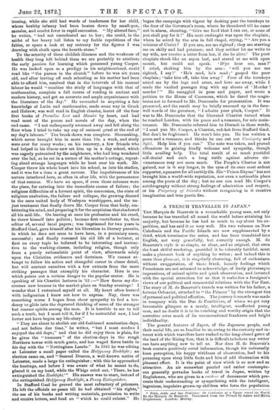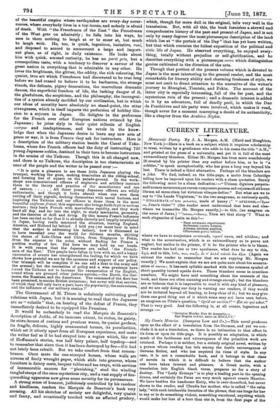A FRENCH TRAVELLER IN JAPAN.*
THE Marquis de Beauvoir is a remarkable young man, not only because he has travelled all round the world before attaining his majority, but because he has had so much to say about his ex- pedition, and has said it so very well. His two volumes on New Caledonia and the Pacific Islands are now supplemented by a third, which terminates the series, and has been translated into English, not very gracefully, but correctly enough. M. de Beauvoir's F.tyle is so simple, so clear, and so original, that even the least skilful rendering, provided it be tolerably faithful, must make a pleasant book of anything he writes ; and indeed this is more than pleas.tat, it is singularly charming, full of enthusiasm without exaggeration, of thos3 frank, homely feelings which Frenchmen are not ashamed to acknowledge, of lively picturesque impressions, of animal spirits and quick observation, and invested with the special attraction for us that it embodies a foreigner's views of our political and commercial relations with the Far East, The story of M. de Beauvoir's travels was written for his father, a fervent Orleauist, attached to "the Princes" by the strongest ties of personal and political affection. The journey it records was made in company with the Due de Penthievre, of whom we get very favourable glimpses as a manly, intelligent, unaffected young man, and no doubt it is to its touching and worthy origin that the narrative owes much of its unconventional frankness and bright individuality.
The general features of Japan, of the Japanese people, and their social life, are so familiar to us, owing to the curiosity and in- terest with which travellers have rushed to the long-closed gates of the land of the Rising Sun, that it is difficult to believe any writer can have anything new to tell us. Nor does M. de Beauvoir's book contain positively novel information, though his universally keen perception, his happy vividness of observation, lead to his pouncing upon stray little facts and bits of odd illustration with pleasant effect. It is the point of view which is so new and so attractive. An air somewhat puzzled and rather contemptu- ous generally pervades books of travel in Japan, written by Englishmen, who are given to a raideur of demeanour which pre- vents their understanding or sympathising with the intelligent,' ingenious, impulsive grown-up children who form the population * Jeddo, and San Francisco: Me Conclusion of a Voyage round Me World.
By the Marquis de Beauvoir. Translated from the French by Agnes and Helen Stephenson. London: Murray.
of the beautiful empire where earthquakes are every, day occur- rences, where everybody lives in a toy-house, and nobody is afraid of death. With "the Frenchmen of the East" the Frenchman of the West gets on admirably ; he falls into his ways, he sees in them nothing to laugh at or to sneer at, but much to laugh with. He, too, is quick, ingenious, imitative, ruse, and disposed to accord to amusement a large and import- ant place, as of right, in daily existence. He looks about him with quick, amused curiosity, he ha no parti prig, but a cosmopolitan taste, with a tendency to discover a savour of the great nation in everything that is admirable in any other. He loves the brightness, the glitter, the oddity, the rich colouring, the quaint, true art which Frenchmen had discovered to be true long before we had ceased to believe it to be barbarous, the strange viands, the delicate, pigmy decorations, the marvellous dramatic dances, the superficial freedom of life, the lurking danger of it, the gleefulness, the scepticism, and the philosophy, the incongrui- ties of a system already modified by our civilisation, but in which our ideas of morality have absolutely no stand-point, the utter strangeness, which in itself imparts the perfection of holiday illu- sion to a sojourn in Japan. He delights in the preference for the French over other European nations evinced by the Japanese; he joins slyly in their quiet ridicule of English morgue and inadaptiveness, and he revels in the know- ledge that when the Japanese desire to learn any new arts of peace or war, it is from France they ask for instructors. Here is a description of the military station beside the Canal of Yoko- hama, where five French officers had the duty of instructing 700 young Japanese nobles, destined in their turn to become instructors in the armies of the Taikoun. Though this is all changed now, and there is no Taikoun, the description is too characteristic at once of the people and the writer to be passed over :—
" It is quite a pleasure to see these little Japanese playing the trumpet, working the guns, making demivoltes at the riding-school, and forming line of square on the parade-ground. In the work- shops non-commissioned officers of engineers and artillery instruct them in the theory and practice of the manufacture and use of cannon All these young Japanese officers are wildly enthusiastic, and though it looks absurd when one sees them cutting off their pigtails, decking themselves with metal buttons, and imploring the Taikoun and our officers to dress them in the most beautiful uniforme franziF, this eagerness also brings forth fruit in serious matters ; they learn French with marvellous rapidity, and they work hard all day, and far into the night, to study mechanics, geometry, and the theories of drill and firing. By this means French influence has been carried so far that it is already cleverly and happily established in Japan, having really mastered the situation, leaving England, America, and Holland far behind. I told you (we must bear in mind that the author is addressing his father), how it distressed us to have travelled over the world for thirteen months, skirting the shores of Indo-China and China, from Singapore to Pekin, from the equator to the poles, without finding for France a position worthy of her. But here we may hold up our heads. It is with reason that the Japanese are called 'the French- men of the East.' This people have fallen in love with us, and a happy succession of events has strengthened the feeling, for which we have shown how grateful we are by the openness and support of our policy. Our triumph will be complete if we can add a fleet to the army and the arsenal ; but the necessities of policy and a wise prudence have forced the Taikoun not to increase the exasperation of the English, round whom are grouped other jealous nations,—the Dutch, the Ger- mans, the Russians, and the Americans. The command of the fleet has been promised, to soothe British irritations ; but never will that service, of which they will only have a part, have the popularity, the enthusiasm, and the influence of our military station !"
The Government of M. Thiers is sedulously cultivating good relations with Japan, but it is amusing to read that the Japanese are so " volatile " that, on hearing of the defeat of France, they immediately desired to be equipped like Prussians.
It would be melancholy to read the Marquis de Beauvoir's description of Jeddo, of its immense extent, its riches, its gaiety, its store-houses of curious and precious wares, its quaint gardens, its fragile, delicate, highly ornamented houses, its peculiarities, which set it utterly apart from all European experience, and make the writer feel as if he had strayed into a region which, like one of Hoffmann's stories, was half fairy palace, half toysbop—and to remember that since then it has been destroyed by fire—if it had not lately been rebuilt. But we take comfort from that remem- brance. Once more the one-storeyed houses, whose walls are screens of finely wrought paper, which slide into grooves, whose furniture is dainty mats, lacquer tables and tea-trays, with services of innumerable saucers for " plenishing," stud the winding tangled steeps of the once mysterious city, and a vast supply of fire- quenching apparatus now gives some security for its permanence.
A strong sense of humour, judiciously controlled by his candour and kindliness, renders the Marquis de Beauvoir's book very amusing. All his sketches of society are delightful, very quaint and funny, and occasionally touched with an affected prudery, which, though far more dull in the original, tells very well in the translation. But, with all this, the book furnishes a shrewd and comprehensive history of the past and present of Japan, and is not only by many degrees the most picturesque description of the land which lies at "the portals of the Day" that has yet been written, but that which contains the fullest exposition of the political and civic life of Japan. He observed everything, he enjoyed every- thing, totally without prejudice or self-glorification, and he describes everything with a picturesque verve which distinguishes genius cultivated in the direction of the arts.
Though that portion of the present volume which is devoted to Japan is the most interesting to the general reader, and the most. remarkable for literary ability and charming freshness of style, we must not omit to direct attention to the narrative of the writer's journey to Shanghai, Tientsin, and Pekin. The account of the latter city is especially interesting, full of the far past, and the mysterious ruin of the present ; and a dramatic interest is added to it by an adventure, full of deadly peril, in which the Due de Penthievre and his party were involved, which makes it read, though never for a moment conveying a doubt of its authenticity, like a chapter from the Arabian Nights.



































 Previous page
Previous page